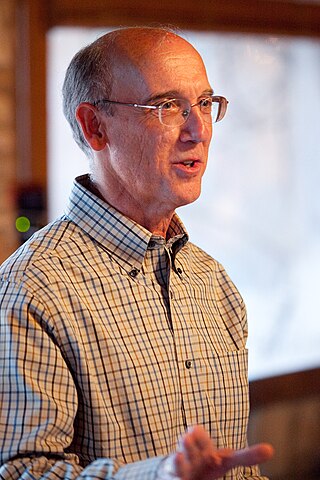Related Research Articles
Psychotherapy is the use of psychological methods, particularly when based on regular personal interaction, to help a person change behavior, increase happiness, and overcome problems. Psychotherapy aims to improve an individual's well-being and mental health, to resolve or mitigate troublesome behaviors, beliefs, compulsions, thoughts, or emotions, and to improve relationships and social skills. Numerous types of psychotherapy have been designed either for individual adults, families, or children and adolescents. Certain types of psychotherapy are considered evidence-based for treating some diagnosed mental disorders; other types have been criticized as pseudoscience.

Albert Ellis was an American psychologist and psychotherapist who founded rational emotive behavior therapy (REBT). He held MA and PhD degrees in clinical psychology from Columbia University, and was certified by the American Board of Professional Psychology (ABPP). He also founded, and was the President of, the New York City-based Albert Ellis Institute. He is generally considered to be one of the originators of the cognitive revolutionary paradigm shift in psychotherapy and an early proponent and developer of cognitive-behavioral therapies.

Forgiveness, in a psychological sense, is the intentional and voluntary process by which one who may have felt initially wronged, victimized, harmed, or hurt goes through a process of changing feelings and attitude regarding a given offender for their actions, and overcomes the impact of the offense, flaw or mistake including negative emotions such as resentment or a desire for vengeance. Theorists differ in the extent to which they believe forgiveness also implies replacing the negative emotions with positive attitudes, or requires reconciliation with the offender. In certain legal contexts, forgiveness is a term for absolving someone of debt, loan, obligation, or other claims. Such legal usage can also be thought of as mercy, being distinct from forgiveness.
Clinical psychology is an integration of human science, behavioral science, theory, and clinical knowledge for the purpose of understanding, preventing, and relieving psychologically-based distress or dysfunction and to promote subjective well-being and personal development. Central to its practice are psychological assessment, clinical formulation, and psychotherapy, although clinical psychologists also engage in research, teaching, consultation, forensic testimony, and program development and administration. In many countries, clinical psychology is a regulated mental health profession.
Counseling psychology is a psychological specialty that began with a focus on vocational counseling, but later moved its emphasis to adjustment counseling, and then expanded to cover all normal psychology and psychotherapy. There are many subcategories for counseling psychology, such as marriage and family counseling, rehabilitation counseling, clinical mental health counseling, educational counseling, etc. In each setting, they are all required to follow the same guidelines.
Rational emotive behavior therapy (REBT), previously called rational therapy and rational emotive therapy, is an active-directive, philosophically and empirically based psychotherapy, the aim of which is to resolve emotional and behavioral problems and disturbances and to help people to lead happier and more fulfilling lives.
Person-centered therapy (PCT), also known as person-centered psychotherapy, person-centered counseling, client-centered therapy and Rogerian psychotherapy, is a form of psychotherapy developed by psychologist Carl Rogers and colleagues beginning in the 1940s and extending into the 1980s. Person-centered therapy seeks to facilitate a client's actualizing tendency, "an inbuilt proclivity toward growth and fulfillment", via acceptance, therapist congruence (genuineness), and empathic understanding.
Couples therapy attempts to improve romantic relationships and resolve interpersonal conflicts.
Leslie Samuel Greenberg is a Canadian psychologist born in Johannesburg, South Africa, and is one of the originators and primary developers of Emotion-Focused Therapy for individuals and couples. He is a professor emeritus of psychology at York University in Toronto, and also director of the Emotion-Focused Therapy Clinic in Toronto. His research has addressed questions regarding empathy, psychotherapy process, the therapeutic alliance, and emotion in human functioning.

Although modern, scientific psychology is often dated from the 1879 opening of the first psychological clinic by Wilhelm Wundt, attempts to create methods for assessing and treating mental distress existed long before. The earliest recorded approaches were a combination of religious, magical and/or medical perspectives. Early examples of such psychological thinkers included Patañjali, Padmasambhava, Rhazes, Avicenna and Rumi.
Emotionally focused therapy and emotion-focused therapy (EFT) are related humanistic approaches to psychotherapy that aim to resolve emotional and relationship issues with individuals, couples, and families. These therapies combine experiential therapy techniques, including person-centered and Gestalt therapies, with systemic therapy and attachment theory. The central premise is that emotions influence cognition, motivate behavior, and are strongly linked to needs. The goals of treatment include transforming maladaptive behaviors, such as emotional avoidance, and developing awareness, acceptance, expression, and regulation of emotion and understanding of relationships. EFT is usually a short-term treatment.
Gay affirmative psychotherapy is a form of psychotherapy for non-heterosexual people, specifically gay and lesbian clients, which focuses on client comfort in working towards authenticity and self-acceptance regarding sexual orientation, and does not attempt to "change" them to heterosexual, or to "eliminate or diminish" same-sex "desires and behaviors". The American Psychological Association (APA) offers guidelines and materials for gay affirmative psychotherapy. Affirmative psychotherapy affirms that homosexuality or bisexuality is not a mental disorder, in accordance with global scientific consensus. In fact, embracing and affirming gay identity can be a key component to recovery from other mental illnesses or substance abuse. Clients whose religious beliefs are interpreted as teaching against homosexual behavior may require some other method of integration of their possibly conflicting religious and sexual selves.
Common factors theory, a theory guiding some research in clinical psychology and counseling psychology, proposes that different approaches and evidence-based practices in psychotherapy and counseling share common factors that account for much of the effectiveness of a psychological treatment. This is in contrast to the view that the effectiveness of psychotherapy and counseling is best explained by specific or unique factors that are suited to treatment of particular problems.

Donald H. Baucom, is a clinical psychology faculty member at the University of North Carolina-Chapel Hill. He is recognized for founding the field of Cognitive-Behavioral Couples Therapy. Baucom is also recognized as one of the top marital therapists and most prolific researchers in this field. Currently, Baucom's National Cancer Institute funded study, CanThrive, has the largest observationally coded sample of any couples study to date.
Clinical behavior analysis is the clinical application of behavior analysis (ABA). CBA represents a movement in behavior therapy away from methodological behaviorism and back toward radical behaviorism and the use of functional analytic models of verbal behavior—particularly, relational frame theory (RFT).
The Power of Forgiveness is a 2008 documentary film by Martin Doblmeier about the process of forgiveness. It features interviews with renowned Buddhist teacher Thich Nhat Hanh, Nobel Laureate Elie Wiesel, best-selling authors Thomas Moore and Marianne Williamson and others.
Family therapy is a branch of psychotherapy focused on families and couples in intimate relationships to nurture change and development. It tends to view change in terms of the systems of interaction between family members.
David Gordon Benner is a Canadian depth psychologist, author and wisdom teacher.
A forgiveness scale is a psychological test that attempts to measure a person's willingness to forgive. A true definition of forgiveness is debated by many researchers, yet Hargrave suggests that forgiveness refers to releasing resentment towards an offender.
Marvin R. Goldfried is an American psychologist and retired distinguished professor of clinical psychology at Stony Brook University. His area of interest include psychotherapy integration and LGBT issues. He is married to Anita Goldfried and has two sons, Daniel and Michael.
References
- 1 2 3 Virginia Commonwealth University. "Psychology Department". Archived from the original on 16 October 2013. Retrieved 11 February 2014.
- 1 2 Worthington, Everett. "Curriculum Vita" (PDF). Retrieved 11 February 2014.
- ↑ Healy, Melissa (December 31, 2007). "Forgive and be well?". Los Angeles Times. Retrieved 24 October 2014.
- ↑ Grossman, Cathy (October 12, 2006). "Experts: Forgive doesn't mean forget". USA Today. Retrieved 24 October 2014.
- ↑ Izbicki, Ashley (May 2, 2013). "Cold case: Son ready to forgive mother's killer". WBIR-TV. Archived from the original on 24 October 2014. Retrieved 24 October 2014.
- ↑ Worthington, Everett. "Everett Worthington" . Retrieved 11 February 2014.
- ↑ Worththington, Everett (1993). Hope for troubled marriages: Overcoming common problems and major difficulties. Downers Grove, IL: InterVarsity Press. ISBN 978-0830816026.
- ↑ Worthington, Everett (2008). Steps to REACH forgiveness and to reconcile. Boston: Pearson Custom Publishing.
- ↑ Wade, Nathaniel; William, Hoyt; Julia, Kidwell; Everett, Worthington (2014). "Efficacy of psychotherapeutic interventions to promote forgiveness: A meta-analysis". Journal of Consulting and Clinical Psychology. 82 (1): 154–170. doi:10.1037/a0035268. PMID 24364794.
- ↑ Worthington, Everett (2009). A just forgiveness: Responsible healing without excusing injustice. Downers Grove, IL: InterVarsity Press. ISBN 978-0830837014.
- ↑ Worthington, Everett (2006). Forgiveness and reconcilitaiton: Theory and application. New York: Routledge. ISBN 978-1583913338.
- ↑ Worthington, Everett; Witvliet, Charlotte; Pietrini, Pietro; Miller, Andrea (2007). "Forgiveness, health and well-being: A review of evidence for emotional versus decisional forgiveness, dispositional forgiveness, and reduced unforgiveness". Journal of Behavioral Medicine. 30 (4): 291–302. doi:10.1007/s10865-007-9105-8. PMID 17453329. S2CID 9482481.
- ↑ Worthington, Everett; Scherer, Michael (2004). "Forgiveness is an emotion-focused coping strategy that can reduce health risks and promote health resilience: Theory, review, and hypotheses". Psychology & Health. 19 (3): 385–405. doi:10.1080/0887044042000196674. S2CID 10052021.
- ↑ Worthington, Everett (1988). "Understanding the values of religious clients: A model and its application to counseling". Journal of Counseling Psychology. 35 (2): 166–174. doi:10.1037/0022-0167.35.2.166.
- 1 2 3 Worthington, Everett (2011). "Chapter 20: Religion and Spirituality". In Norcross, John (ed.). Relationships that work. Oxford University Press. pp. 402–419. ISBN 978-0-19-973720-8.
- ↑ Worthington, Everett; Johnson, Eric; Hook, Joshua; Aten, Jamie (2013). Evidence-based practices for Christian counseling and psychotherapy. Downers Grove, IL: InterVarsity Press. ISBN 978-0830840274.
- ↑ Worthington, Everett; Hook, Joshua; Davis, Don; Gartner, Aubrey; Jennings, David (2013). "Chapter 34: Conducting empirical research on religiously accommodated treatments". In Pargament, Kenneth (ed.). APA handbooks in psychology: APA handbook of psychology, religion, and spirituality. pp. 651–669. ISBN 978-1-4338-1077-0.
- ↑ Rye, Mark; Pargament, Kenneth (2002). "Forgiveness and romantic relationships in college: Can it heal the wounded heart?". Journal of Clinical Psychology. 58 (4): 419–441. doi:10.1002/jclp.1153. PMID 11920695.
- ↑ Norcross, John; Wampold, Bruce (2011). "Chapter 21: Evidence-based therapy relationships: Research conclusions and clinical practices.". In Norcross, John (ed.). Relationships that Work (2nd ed.). New York: Oxford University Press. pp. 423–430. ISBN 978-0-19-973720-8.
- ↑ Worthington, Everett (1989). Marriage counseling: A Christian approach to counseling couples. Downers Grove, IL: InterVarsity Press. ISBN 978-0830817696.
- 1 2 Worthington, Everett (1999). Hope-focused Marriage Counseling: A guide to Brief Therapy. Downers Grove, IL: InterVarsity Press. ISBN 978-0830827640.
- ↑ Ripley, Jennifer; Worthington, Everett (2014). Couple therapy: A new hope-focused approach. Downers Grove, IL: InterVarsity Press.